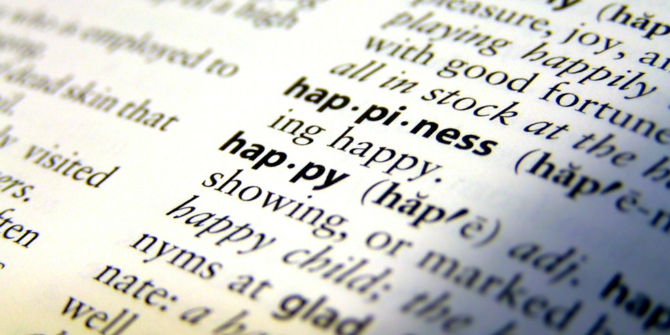 Last week the Lords Science and Technology Committee published their report on how the government uses behavioural change interventions. In light of this report Sander van der Linden questions whether the ‘science’ of nudging, which is often based on social-psychological theories, will change the population’s behaviour. He argues that more weight should be given to a wider range of factors, including neurological research.
Last week the Lords Science and Technology Committee published their report on how the government uses behavioural change interventions. In light of this report Sander van der Linden questions whether the ‘science’ of nudging, which is often based on social-psychological theories, will change the population’s behaviour. He argues that more weight should be given to a wider range of factors, including neurological research.
One of the questions the Lords Science and Technology Committee is hoping to shed some light on with their recently published report on the government’s use of behavioural change interventions is whether nudge is a real solution. Some serious question marks can be put around the ‘science’ part of this new approach to behavioural public policy. For example, a key concept in the nudge literature is the idea that the human brain can be sliced into two categorically different systems, namely; the unconscious, intuitive (system 1) and the conscious, deliberate (system 2).
While social-psychological theories dealing with dual-processing undoubtedly have validity in their own right, it is the combination of these theories with the concept of ‘nudge’ that should raise an eyebrow among behavioural scientists. Simply because a correct understanding of some of the issues raised in ‘nudge theory’ lies not in the separation (which only exists in theory by the way) but in the integration and interrelation of various neurological processes.
Consider the concept of ‘unrealistic optimism’. In the nudge literature it is described as a pervasive feature of human life, characterizing most people in most social situations. In particular, it is believed that unrealistic optimism can explain a lot of individual risk-taking behaviour and thus, if people are running risks for being unrealistically optimistic, a liberal paternalistic approach (i.e. the nudge) might help improve that person’s well-being by countering some of that person’s ill-founded optimism. While this approach may sound appealing on the surface, it is overly simplistic and there are some major issues left out of the discussion.
For example, individual risk behaviour is incredibly complicated and encompasses a wide range of factors including emotional drives, cultural factors, social amplification and even genetic variability. Therefore, the claim that unrealistic optimism explains significant variance in individual risk-taking behaviour is somewhat unfounded and questionable at best.
To the extent that unrealistic optimism does explain variance in risk-taking behaviour, there is another danger in the line that we should nudge more realism into (unrealistic) optimism. From prior neurological research we know that trait optimism (imagining positive future events relative to negative ones) is specifically correlated to increased activity in the amygdala and the rostral anterior cingulated cortex (rACC). Understanding unrealistic optimism lies not in a system 1 or 2 approach but rather in the communication and complex integration of both the brain’s ‘higher developed’ structures and its evolutionary older regions. Unrealistic optimism is facilitated by the fact that the future (as opposed to the past) is open to interpretation, and therefore it is easier for people to distance themselves from possible negative events and move closer toward positive ones.
It is indeed a pervasive feature of human life and there is a good reason for it; irrational optimism is an evolutionary adaptive mechanism that enhances both our mental and physical health. Unlike other animals, humans have to live with the foresight of their own inevitable death, which interferes with the ability to continuously plan ahead and imagine a worthwhile future. Thus, the only way for optimism to have evolved is with a persistent ability to picture a bright future (i.e. irrational optimism, e.g. the ability to live forever someday). The expectation and imagination of compelling positive future events is crucial in motivating present behaviour towards a future goal. In fact, unrealistic optimism is what gets us out of bed in the morning and is inherent in all healthy individuals. More importantly, it is the same brain regions that malfunction in depressed patients. One of the main symptoms of depression is the inability to imagine a positive future.
While evolutionary hardwires are adaptive, they are not always intelligent. It is true that sometimes unrealistic optimism might also inspire less desirable behaviours (e.g. teenagers that take up smoking). Yet, teen smoking is often also a construction of social pressure, cultural amplifications and / or a genetic predisposition. Moreover, countering unrealistic optimism (i.e. nudging someone to ponder over possible negative events) is likely to promote anxiety and depression. In other words, there are no magic fixes and the potential consequences of behavioural interventions need to be weighted carefully based on a grounded and correct understanding of underlying behavioural processes.
In their recent report (after a year long investigation), the Lord’s committee certainly did not seem to be unrealistically optimistic about the potential of nudge. The committee concluded that behavioural interventions are nothing new and behavioural change on a nation-wide scale is certainly not going to be achieved by employing quick-fix solutions such as ‘nudge’ in isolation. The government needs to be braver about mixing and matching appropriate solutions and rely on well-informed, (most notably) independent scientific advice. In short, as many behavioural scientists will agree to, there is more to behavioural change than nudge.
Please read our comments policy before posting.








1 Comments